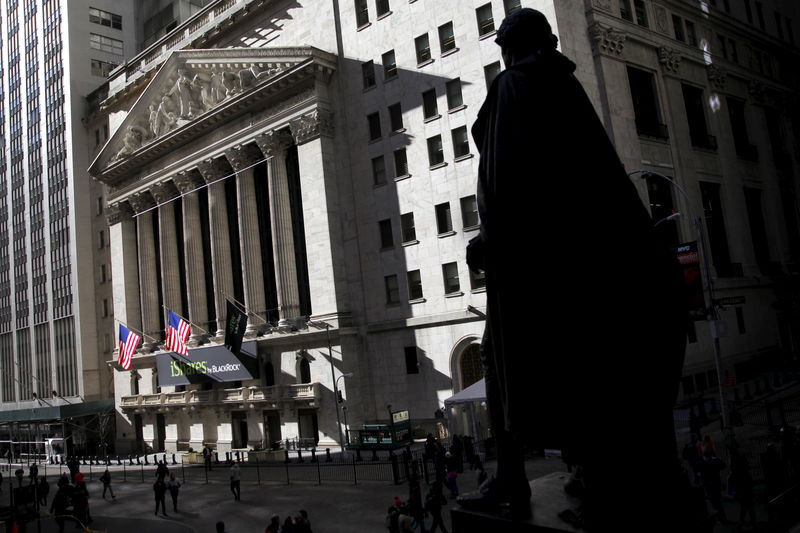Investing.com -- Investors attempt to parse out the implications of softer-than-expected U.S. inflation data, with the July producer price index set to be released later on Friday. Elsewhere, News Corp sounds off on its generative artificial intelligence plans, while the Supreme Court places a temporary block on OxyContin-maker Purdue Pharma's $6 billion bankruptcy settlement.
1. Futures mixed ahead of producer price data
U.S. stock futures were mixed Friday, as traders digested cooler-than-anticipated U.S. inflation data and looked ahead to the release of a monthly measure of producer price growth later in the session.
By 05:21 ET (09:21 GMT), the Dow futures contract added 32 points or 0.09%, S&P 500 futures were mostly unchanged, and Nasdaq 100 futures slipped by 19 points or 0.12%.
Underpinning sentiment heading into the last day of trading this week was Thursday's U.S. consumer price index, which showed that annual headline inflation in the world's largest economy rose by less than expected in July. On a monthly basis, the reading increased by 0.2% for a second straight month, bolstering projections that the Federal Reserve may soon back away from its long-running campaign of interest rate hikes.
More detail will likely be added to the inflation picture today with the publication of the producer price index for last month. Economists estimate that the figure, which gauges the selling prices received by domestic producers, accelerated to 0.7% annually and 0.2% monthly in July. The core number, which removes food and energy, is seen picking up the pace slightly to 0.2% month-on-month, but slowing marginally to 2.3% year-on-year.
2. News Corp eyes AI
Media mogul Rupert Murdoch's News Corp (NASDAQ:NWSA) saw revenue fall by almost a tenth in the latest quarter, dragging the owner of the Wall Street Journal and the Sunday Times down to a three-month loss.
The decline was mitigated, however, by the company's Dow Jones division. The publisher of Market Watch and Barron's posted segment earnings of $133 million, a jump of 25% and the unit's best profit since joining News Corp.
Meanwhile, Chief Executive Officer Robert Thomson outlined the group's wider plans to adjust to the emergence of generative artificial intelligence. Calling it a "challenge" to the maintenance of publishers' intellectual property, Thomson said News Corp is in active negotiations to set a value for its content and IP.
But Thomson maintained that generative AI still represents a "remarkable opportunity" to build fresh revenue sources and slash costs.
News Corp shares were little changed in premarket U.S. trading Friday.
3. Supreme Court halts Purdue Pharma opioid settlement
The U.S. Supreme Court has temporarily blocked the bankruptcy proceedings of Purdue Pharma, casting doubt over whether members of the Sackler family that owns the company can be shielded from any future claims related to the U.S. opioid epidemic.
Earlier this year, a lower court approved a deal that would have shielded the Sacklers from potential lawsuits in return for a one-off payment of $6B to victims of the crisis.
The Justice Department subsequently asked that the settlement be delayed, claiming that it improperly removes any future liability from third parties for contributing to the crisis. The Supreme Court has now agreed to hear oral arguments in December.
Purdue, the maker of opioid painkiller OxyContin, would need the agreement to exit bankruptcy. The company has rebuffed the DoJ's request, arguing that it would take "billions of dollars" out of opioid recovery programs and eventually make "meaningful recovery" for victims more difficult.
4. UBS ends Credit Suisse deal's state backstop
UBS (SIX:UBSG) announced on Friday that it no longer needed government backing worth CHF 9B, or just over $10B, that was put in place to protect the Swiss banking giant from losses linked to its takeover of rival Credit Suisse.
The rescue had included an agreement from the state to shield UBS from CHF 9B in losses from the arrangement, as long as it guaranteed to take a hit of CHF 5B.
UBS also halted a CHF 100B liquidity backstop that was offered by the Swiss National Bank. The aid was first established during a crisis in March that rocked the country's banking sector and eventually led to the state-sponsored tie-up between UBS and Credit Suisse.
Following a "comprehensive assessment" of Credit Suisse's non-core assets, UBS said it had concluded that it was not necessary to maintain these liquidity support measures. Credit Suisse, meanwhile, fully repaid a CHF 50B emergency loan from the Swiss government first, UBS added.
Swiss-listed shares in UBS climbed Friday.
5. Crude hovers around flatline
Oil prices were choppy Friday, but stayed mostly around the flatline, with traders trying to judge U.S. inflation data, concerns about a stuttering economic recovery in top crude importer China, and optimistic demand forecasts from OPEC.
Thursday’s U.S. CPI release saw the dollar strengthening, hurting the crude market as it makes the commodity more expensive for buyers holding foreign currencies.
Growing fears over China’s economy also weighed on oil markets, but this was counterbalanced by the Organization of the Petroleum Exporting Countries confirming on Thursday that it still expects world oil demand to rise by 2.25 million barrels per day in 2024, compared with the growth of 2.44 million barrels per day this year.
By 05:22 ET, U.S. crude futures traded 0.4% lower at $82.47 a barrel, while the Brent contract dipped 0.5% to $86.01.
